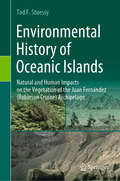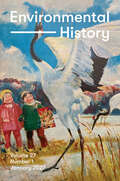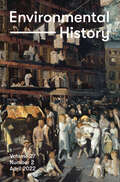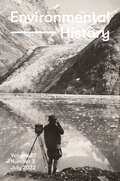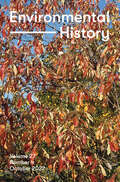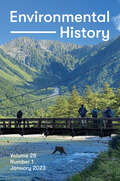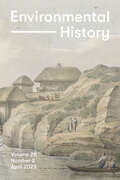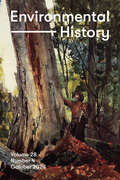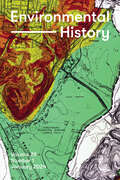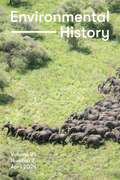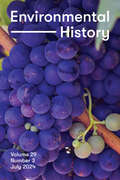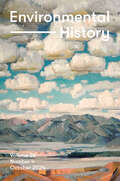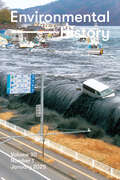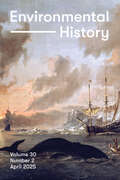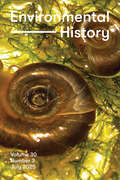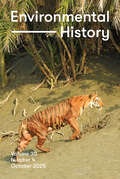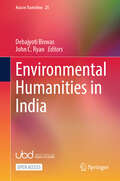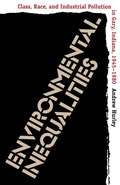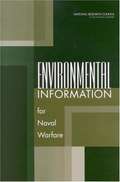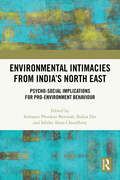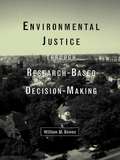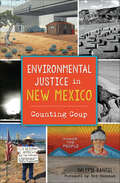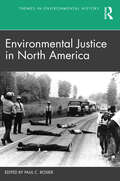- Table View
- List View
Environmental History of Britain since the Industrial Revolution, An
by B. W. ClappThe present and future state of the environment gives rise to ever increasing concern, but much less is known as yet about the past: the damage that has been done since, and by, the Industrial Revolution; how far our predecessors were aware of it; the steps they took; and the gradual development of a wider concern for the state of the world and our impact on it. This timely and pioneering survey, designed for general readers as well as students and scholars, is a substantial contribution to that understanding.
Environmental History of Oceanic Islands: Natural and Human Impacts on the Vegetation of the Juan Fernández (Robinson Crusoe) Archipelago
by Tod F. StuessyThe Juan Fernández Archipelago is located in the Pacific Ocean west of Chile at 33° S latitude. Robinson Crusoe Island is 667 km from the continent and approximately four million years old; Alejandro Selkirk Island is an additional 181 km west and only one million years old. The natural impacts of subsidence and erosion have shaped the landscapes of these islands, resulting in progressive changes to their subtropical vegetation. The older island has undergone more substantial changes, due to both natural causes and human impacts. After the discovery of Robinson Crusoe Island in 1574, people began cutting down forests for lumber to construct boats and homes, for firewood, and to make room for pastures. Domesticated plants and animals were introduced, some of which have since become feral or invasive, causing damage to the local vegetation. The wealth of historical records on these activities provides a detailed chronicle of how human beings use their environment for survival in a new ecosystem. This book offers an excellent case study on the impacts that people can have on the resources of an oceanic island.
Environmental History, volume 27 number 1 (January 2022)
by Environmental HistoryThis is volume 27 issue 1 of Environmental History. Environmental History (EH) is the world’s leading scholarly journal in environmental history and the journal of record in the field. Scholarship published in EH explores the changing relationships between humans and the environment over time. This interdisciplinary journal brings together insights from geography, anthropology, the natural sciences, and many other disciplines to inform historical scholarship.
Environmental History, volume 27 number 2 (April 2022)
by Environmental HistoryThis is volume 27 issue 2 of Environmental History. Environmental History (EH) is the world’s leading scholarly journal in environmental history and the journal of record in the field. Scholarship published in EH explores the changing relationships between humans and the environment over time. This interdisciplinary journal brings together insights from geography, anthropology, the natural sciences, and many other disciplines to inform historical scholarship.
Environmental History, volume 27 number 3 (July 2022)
by Environmental HistoryThis is volume 27 issue 3 of Environmental History. Environmental History (EH) is the world’s leading scholarly journal in environmental history and the journal of record in the field. Scholarship published in EH explores the changing relationships between humans and the environment over time. This interdisciplinary journal brings together insights from geography, anthropology, the natural sciences, and many other disciplines to inform historical scholarship.
Environmental History, volume 27 number 4 (October 2022)
by Environmental HistoryThis is volume 27 issue 4 of Environmental History. Environmental History (EH) is the world’s leading scholarly journal in environmental history and the journal of record in the field. Scholarship published in EH explores the changing relationships between humans and the environment over time. This interdisciplinary journal brings together insights from geography, anthropology, the natural sciences, and many other disciplines to inform historical scholarship.
Environmental History, volume 28 number 1 (January 2023)
by Environmental HistoryThis is volume 28 issue 1 of Environmental History. Environmental History (EH) is the world’s leading scholarly journal in environmental history and the journal of record in the field. Scholarship published in EH explores the changing relationships between humans and the environment over time. This interdisciplinary journal brings together insights from geography, anthropology, the natural sciences, and many other disciplines to inform historical scholarship.
Environmental History, volume 28 number 2 (April 2023)
by Environmental HistoryThis is volume 28 issue 2 of Environmental History. Environmental History (EH) is the world’s leading scholarly journal in environmental history and the journal of record in the field. Scholarship published in EH explores the changing relationships between humans and the environment over time. This interdisciplinary journal brings together insights from geography, anthropology, the natural sciences, and many other disciplines to inform historical scholarship.
Environmental History, volume 28 number 3 (July 2023)
by Environmental HistoryThis is volume 28 issue 3 of Environmental History. Environmental History (EH) is the world’s leading scholarly journal in environmental history and the journal of record in the field. Scholarship published in EH explores the changing relationships between humans and the environment over time. This interdisciplinary journal brings together insights from geography, anthropology, the natural sciences, and many other disciplines to inform historical scholarship.
Environmental History, volume 28 number 4 (October 2023)
by Environmental HistoryThis is volume 28 issue 4 of Environmental History. Environmental History (EH) is the world’s leading scholarly journal in environmental history and the journal of record in the field. Scholarship published in EH explores the changing relationships between humans and the environment over time. This interdisciplinary journal brings together insights from geography, anthropology, the natural sciences, and many other disciplines to inform historical scholarship.
Environmental History, volume 29 number 1 (January 2024)
by Environmental HistoryThis is volume 29 issue 1 of Environmental History. Environmental History (EH) is the world’s leading scholarly journal in environmental history and the journal of record in the field. Scholarship published in EH explores the changing relationships between humans and the environment over time. This interdisciplinary journal brings together insights from geography, anthropology, the natural sciences, and many other disciplines to inform historical scholarship.
Environmental History, volume 29 number 2 (April 2024)
by Environmental HistoryThis is volume 29 issue 2 of Environmental History. Environmental History (EH) is the world’s leading scholarly journal in environmental history and the journal of record in the field. Scholarship published in EH explores the changing relationships between humans and the environment over time. This interdisciplinary journal brings together insights from geography, anthropology, the natural sciences, and many other disciplines to inform historical scholarship.
Environmental History, volume 29 number 3 (July 2024)
by Environmental HistoryThis is volume 29 issue 3 of Environmental History. Environmental History (EH) is the world’s leading scholarly journal in environmental history and the journal of record in the field. Scholarship published in EH explores the changing relationships between humans and the environment over time. This interdisciplinary journal brings together insights from geography, anthropology, the natural sciences, and many other disciplines to inform historical scholarship.
Environmental History, volume 29 number 4 (October 2024)
by Environmental HistoryThis is volume 29 issue 4 of Environmental History. Environmental History (EH) is the world’s leading scholarly journal in environmental history and the journal of record in the field. Scholarship published in EH explores the changing relationships between humans and the environment over time. This interdisciplinary journal brings together insights from geography, anthropology, the natural sciences, and many other disciplines to inform historical scholarship.
Environmental History, volume 30 number 1 (January 2025)
by Environmental HistoryThis is volume 30 issue 1 of Environmental History. Environmental History (EH) is the world’s leading scholarly journal in environmental history and the journal of record in the field. Scholarship published in EH explores the changing relationships between humans and the environment over time. This interdisciplinary journal brings together insights from geography, anthropology, the natural sciences, and many other disciplines to inform historical scholarship.
Environmental History, volume 30 number 2 (April 2025)
by Environmental HistoryThis is volume 30 issue 2 of Environmental History. Environmental History (EH) is the world’s leading scholarly journal in environmental history and the journal of record in the field. Scholarship published in EH explores the changing relationships between humans and the environment over time. This interdisciplinary journal brings together insights from geography, anthropology, the natural sciences, and many other disciplines to inform historical scholarship.
Environmental History, volume 30 number 3 (July 2025)
by Environmental HistoryThis is volume 30 issue 3 of Environmental History. Environmental History (EH) is the world’s leading scholarly journal in environmental history and the journal of record in the field. Scholarship published in EH explores the changing relationships between humans and the environment over time. This interdisciplinary journal brings together insights from geography, anthropology, the natural sciences, and many other disciplines to inform historical scholarship.
Environmental History, volume 30 number 4 (October 2025)
by Environmental HistoryThis is volume 30 issue 4 of Environmental History. Environmental History (EH) is the world’s leading scholarly journal in environmental history and the journal of record in the field. Scholarship published in EH explores the changing relationships between humans and the environment over time. This interdisciplinary journal brings together insights from geography, anthropology, the natural sciences, and many other disciplines to inform historical scholarship.
Environmental Humanities in India (Asia in Transition #25)
by John C. Ryan Debajyoti BiswasThis open access book offers an introduction to the field of the environmental humanities in India. The environmental humanities, often referred to as ‘EH’, are a multifaceted, relatively new, and swiftly evolving field of scholarship that integrates the theories and approaches of various disciplines - from anthropology, art, communications, cultural studies, philosophy and ecology to history, literature, media, music, performance, politics, sociology, theology and theater. Practitioners of this considerably integrative and widely ranging field aim to address and, in certain cases, confront today's urgent ecological and cultural challenges, namely climate change, urban sustainability, biodiversity conservation, species decline, energy policy, the exigencies of the Anthropocene, environmental activism, and Indigenous peoples' justice. Although the environmental humanities have been relatively slow to gain traction in South Asia, an increasing momentum towards transdisciplinary approaches to ecology and sustainability is palpable in India. Comprising fourteen chapters, this contributed volume is the first major publication to call attention to current work in the environmental humanities in India. The volume foregrounds particular ecohumanist theories and methodologies evolving from Indian biocultural contexts. Towards this aim, the book consists of four thematic sections: Indigenous Perspectives: Conservation, Spirituality, and Language; Theoretical Grounding: Education, Law, and Ethics; Literary Formulations: Memoir, Parable, and Storyworlds; and Popular Narratives: Myth, Travel, and Music. The volume is of interest to undergraduates, postgraduates, early career scholars, and more established researchers in the environmental humanities and the allied fields of ecopoetics, ecocriticism, ecomusicology, environmental art, cultural ecology, postcolonial studies, and South Asian studies. This is an open access book.
Environmental Inequalities
by Andrew HurleyBy examining environmental change through the lens of conflicting social agendas, Andrew Hurley uncovers the historical roots of environmental inequality in contemporary urban America. Hurley's study focuses on the steel mill community of Gary, Indiana, a city that was sacrificed, like a thousand other American places, to industrial priorities in the decades following World War II. Although this period witnessed the emergence of a powerful environmental crusade and a resilient quest for equality and social justice among blue-collar workers and African Americans, such efforts often conflicted with the needs of industry. To secure their own interests, manufacturers and affluent white suburbanites exploited divisions of race and class, and the poor frequently found themselves trapped in deteriorating neighborhoods and exposed to dangerous levels of industrial pollution. In telling the story of Gary, Hurley reveals liberal capitalism's difficulties in reconciling concerns about social justice and quality of life with the imperatives of economic growth. He also shows that the power to mold the urban landscape was intertwined with the ability to govern social relations.
Environmental Information for Naval Warfare
by Committee on Environmental Information for Naval UseAccurate and timely environmental information can provide a tactical advantage to U. S. naval forces during warfare. This report analyzes the current environmental information system used by the U. S. Navy and Marine Corps and recommends ways to address uncertainty and leverage network-centric operating principles to enhance the value of environmental information.
Environmental Intimacies from India’s North East: Psycho-Social Implications for Pro-Environment Behaviour
by Indranee Phookan Borooah Sabiha Alam Choudhury Bidita DasThis book explores the intimate relationship of the people of North East India with the environment as evinced from their traditional beliefs, cultural practices, and livelihood. It offers insights into the challenges and adaptability of communities through actions ensuring conservation of the environment yet sustaining their livelihood.The book encompasses movement toward responsible actions and the engagement of communities in pro-environmental behavior. It showcases the various practices, knowledge, and debates on the environment-behavior relationship of the people of North East India. It brings into focus some of the daunting environmental issues and the endeavors for sustenance that is true to a region which is rich in ecological diversity and touches the spirit and psyche of its people.This volume will be of interest to scholars and researchers of psychology, anthropology, sociology, environmental sciences, development studies, law and governance, environmental administration, and South Asia studies.
Environmental Justice Through Research-Based Decision-Making (Routledge Research in Public Administration and Public Policy)
by William M. BowenThis book discusses whether and to what extent there are widespread injustices and inequities caused by the distribution of environmental hazards in America today.
Environmental Justice in New Mexico: Counting Coup (Natural History)
by Valerie RangelIn New Mexico and across America, communities of color bear the brunt of contamination from generations of expansion, mining, nuclear testing and illegal dumping. The nation's largest uranium waste spill occurred in 1979 at Church Rock, and radioactivity in the Rio Puerco remains at dangerous levels. The National Trust for Historic Preservation listed Mount Taylor as one of the ten most endangered historic sites in America. After decades of sickness from Rio Grande river water, the first female governor of a Pueblo Nation, Verna Olgin Teller, led tribal members to a Supreme Court victory over Albuquerque. Valerie Rangel presents stories of strife and struggle in the war to protect the integrity of natural systems, rights to religious freedom and the continuation of traditional customs.
Environmental Justice in North America (Themes in Environmental History)
by Paul C. RosierEmphasizing the voices of activists, this book’s diverse contributors examine communities’ common experiences with environmental injustice, how they organize to address it, and the ways in which their campaigns intersect with related movements such as Black Lives Matter and Indigenous sovereignty. The global COVID-19 pandemic exposed the ways in which BIPOC (Black, Indigenous, People of Color) communities and white working-class communities have suffered disproportionately from the crisis due to sustained exposure to toxic land, air, and water, creating a new urgency for addressing underlying conditions of systemic racism and poverty in North America. In addition to exploring the historical roots of the Environmental Justice movement in the 1980s and 1990s, the volume offers coverage of recent events such as the DAPL pipeline controversy, the Flint water crisis, and the rise of climate justice. The collection incorporates the experiences of rural and urban communities, Alaska Natives, Native Hawaiians, Puerto Ricans, and Indigenous peoples in the U.S., Canada, and Mexico. The chapters offer instructors, undergraduate and graduate students, and general readers a range of accessible case studies that create opportunities for comparative and intersectional analysis across geographical and ethnic boundaries.

